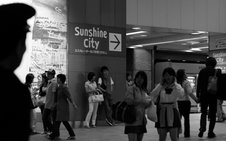 I spent several late nights in the rundown Tokyo suburb of Kamata to research this story, which tries to capture a new form of poverty in Japan.
I spent several late nights in the rundown Tokyo suburb of Kamata to research this story, which tries to capture a new form of poverty in Japan.By HIROKO TABUCHI
May 29, 2007
TOKYO (AP) _ It's almost midnight as Ryo settles into a reclining chair for the night, a can of tea and a pack of cigarettes at his side, a construction job awaiting him in the morning.
For the time being, this cramped cubicle at an Internet cafe _ with its TV and flickering PC monitor _ is home.
Ryo, who refused to give his full name, is part of what experts believe is a new social strata in Japan _ poor, young people who live out of cheap, 24-hour Internet cafes to escape the streets.
Though there are no reliable numbers, experts warn a growing number of younger Japanese are sleeping in cheap Net cafes like Ichigo, where Ryo, who is 30, spends five nights a week. He stays with a friend on weekends.
The rising number of people like Ryo, known as "Internet cafe refugees," has raised enough concern that the Health Ministry is preparing to study the 1,300 Internet cafes nationwide.
Last year, 13 people contracted tuberculosis at an Internet cafe just west of Tokyo that health officials suspect originated from the cafe's homeless population, said Tomohiro Uchino of the Health Ministry's social welfare department.
"The phenomenon raises many issues in terms of health, labor and welfare," said Uchino. "The problem is that we don't yet have an accurate picture of how many homeless people there are in Internet cafes, how they got there, or how the government can intervene," he said.
Behind the rise of Net refugees is Japan's ballooning population of young people who hop from one temporary job to the next.
They are believed to number more than 2 million _ a byproduct of the economic crisis that hit Japan a decade ago, as well as a shift in values among younger generations less ready to conform to the corporate work ethic of their parents and grandparents.
Ryo said part of the reason he ended up homeless was an expensive interest in reggae music. In his twenties, he staged reggae events with his friends and even took trips to Los Angeles to study with musicians there. But then his savings ran dry, he said.
In a city where a tiny studio apartment rarely costs less than $825 a month, the cafes appeal to people like Ryo because staying overnight costs only a fraction of that.
At Ichigo, clients pay 82 cents an hour for a small cubicle equipped with a reclining chair, computer and TV. Many cafes offer free refills of soft drinks; some even have showers. But it's hardly a comfortable environment: The air is stale with cigarette smoke and there is a constant whine of computers, TVs and ventilation fans.
The urban refugees are modern-day versions of the day laborers of Osaka and other big Japanese cities who fueled the tumultuous economic growth of the 1960s _ an underclass that lodged in cheap hostels and who were rounded up each morning to work at nearby construction sites.
Some inhabitants of Net cafes also find work by the day, albeit in a more technology-savvy form. Many rely on their cell phones to arrange casual jobs, according to Makoto Yuasa, who heads a homeless support center in Tokyo.
The arrangement means workers are not required to provide a set address, Yuasa said. However, the casual nature of the work means such workers often receive minimal wages and no training, social security or health insurance.
"With some job agencies, you get a call or an e-mail the night before, telling you where to turn up to work the next day," Yuasa said. "Many are menial cleaning or factory jobs that don't lead anywhere."
Read the rest of the story on USA Today:
http://www.usatoday.com/tech/news/2007-05-29-japan-internet-cafes-homeless_N.htm










1 comment:
Tabuchi様
ヘラルドasahiトップの記事を拝読いたしました。そしてこのブログへきました。日本語のブログはありませんか?興味が在ります。よろしく。
Post a Comment